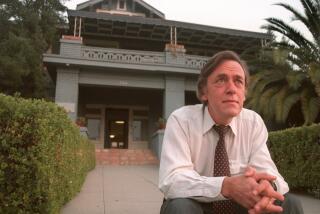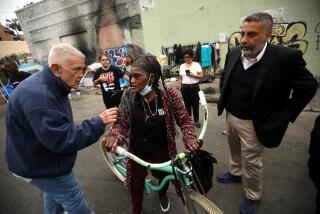Judge’s Close Call Testifies to Dangers in Iraq
- Share via
Los Angeles Judge Judith Chirlin was sitting in the Internet cafe at the United Nations headquarters in Baghdad just 90 minutes before a truck slammed into the building and exploded, killing 23 people and injuring dozens more.
She went to Iraq in August, representing the International Legal Assistance Consortium, a worldwide group of bar associations dedicated to “rebuilding justice in countries shattered by war.” She helped monitor the first free democratic elections of Iraqi bar leaders in more than 30 years and met with justice officials.
Chirlin was one of a group of Los Angeles lawyers who served in Iraq, including Tamara Darweesh, a former public defender, and Michael Farhang, a federal prosecutor, part of the U.S. Justice Department team sent to assess the nation’s criminal justice system.
And Sermid Al-Sarraf, who was born in the United States but lived in Iraq as a teenager, is working through the U.S. State Department and the London-based Iraqi Jurists Assn. to re-establish an independent judiciary capable of prosecuting past human-rights violators.
International efforts to rebuild Iraq’s justice system have been slower than experts expected because of the nation’s immense and immediate infrastructure needs, said Robert Horowitz, staff director of the American Bar Assn.’s Iraq Initiative.
Last month, the ABA sponsored its first legal training program for 30 Iraqi judges, lawyers and policymakers in Bahrain, Horowitz said.
The biggest challenge is restoring a judiciary that was independent and impartial until Saddam Hussein took over in the late 1970s, Al-Sarraf said. “The Iraqi people must have confidence in the legal system,” he said.
Darweesh, who fled Iraq with her family when she was in the first grade, experienced “a sad and strange homecoming” this summer. She blamed Hussein for packing the judiciary with party loyalists and called the level of corruption shocking.
Darweesh described a criminal justice system in which judges were all-powerful and most criminal cases ended with a defendant’s confession. Justice officials will have to strengthen the role of prosecutors, she said, and increase the number of women on the bench.
During the last decade, Chirlin has made more than a dozen trips to Russia and Eastern Europe to lecture judges and lawyers on the importance of an independent judiciary to a free society.
In its report, the legal consortium’s delegation recommended, among other things, that Iraqi judges go through a two-week training course called “Judging in a Democratic Society,” created by the ABA to help Eastern European jurists make the transition from communism.
Chirlin returned to the Los Angeles Superior Court in mid-September, almost a month after fleeing Iraq by taxicab. She does not regret having gone to the strife-torn country but she said she would be more careful about future travel.
“I don’t think I’ll be going into another war zone soon,” she said.
In the hours before the explosion, she wrote an e-mail to family and friends saying she felt “quite safe,” despite the nightly barrage of gunfire. She even boasted that she had learned to distinguish between the sounds of machine gun and handgun fire.
But her attitude changed after the bombing.
On Aug. 19, the day of the explosion, Chirlin and her colleagues canceled a 4:30 p.m. appointment at the U.N. headquarters to attend a meeting with Judge Dahra Nurredin, a member of the Interim Governing Council, across town.
“He’s the one who saved our lives,” Chirlin said. “If we hadn’t canceled that earlier appointment, we would have been in there.”
As the body count grew at the U.N., Chirlin and her colleagues -- Kadhim Lami, a lawyer of Iraqi descent who lives in London; Finn Lynghjem, a judge in Norway; and Christian Ahlund of Sweden, executive director of the consortium -- became concerned about their own safety.
They were scheduled to take a U.N. plane to Jordan the next day but feared that U.N. facilities, like their hotel, might become targets for terrorism.
“We realized how serious it was,” she said, as they sat in the hotel lobby watching U.N. workers covered with blood return from the blast site with updates of the destruction. “Twenty-three dead,” including Sergio Vieira de Mello, the top U.N. envoy in Iraq.
They hired a taxi for the 15-hour drive to Amman, Jordan, and safety.
Recounting the ordeal recently, Chirlin said her delegation had met with De Mello just two days earlier. She said he had been enthusiastic about their proposals.
“We had been in his office literally 50 hours earlier,” the judge said.
More to Read
Sign up for Essential California
The most important California stories and recommendations in your inbox every morning.
You may occasionally receive promotional content from the Los Angeles Times.













